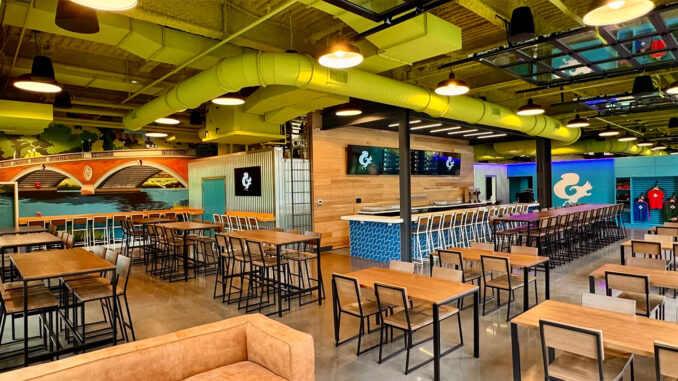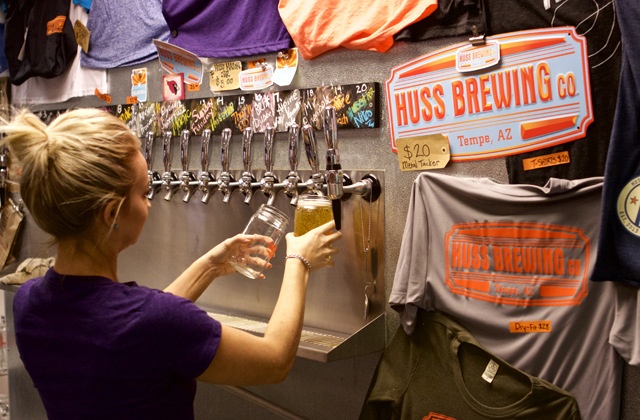
Building a reliable revenue stream outside of taproom traffic, private events can offer both profitability and long-term brand exposure. But as Charlotte Herndon, who has been an Events Manager for breweries like Mighty Squirrel and Exhibit A, she shared that success depends on having a smart, intentional strategy that balances guest experience with operational efficiency.
“Private events are great, they should make you a lot of money,” Herndon said at the 2025 Craft Brewers Conference.
“But there are good things and bad things about them, like always.”
In her example, at Mighty Squirrel’s locations in the Boston area, she oversees a mix of private and semi-private spaces that can accommodate groups from 25 to 200 people. The brewery doesn’t charge a rental fee, but instead requires a minimum spend based on the size and timing of each event.
That model, Herndon said, keeps events profitable while remaining approachable for customers.
The financial upside of hosting private events is clear.
“They are high profit, they should be making a lot of money, and that’s really important in taprooms right now,” Herndon said.
But beyond revenue, private events drive organic marketing and long-term affinity.
READ MORE: Attraction and Retention in Your Taproom
“They’re a fantastic source of word-of-mouth marketing,” she said. “Every single time someone remembers that amazing wedding reception they went to, they’re also going to remember that brewery.”
Herndon emphasized that private events should complement, not replace, a brewery’s day-to-day operations.
“You kind of have a framework for your public events. With your private events, you should be filling in the rest of those spaces,” she explained. “Definitely encourage rentals on low-volume dates and times, especially for local organizations and charities.”
That targeted approach helps keep the taproom full while reserving prime hours for regular customers.
“Always leave room for your regular walk-ins,” she said. “If you’re completely booked out all the time, people won’t know they can come back on a regular basis whenever you’re open.”
To maintain those community connections, Herndon also recommends offering free large-group table reservations for parties that are too big to walk in but not large enough to warrant a full rental. It can also build trust for smaller organizations.
“Sometimes doing a one-time favor for them is really helpful, especially on a day where no one’s walking in the door,” she said.
While the financial benefits are strong, you should also be mindful of the operational strain private events can bring.
“They can take up really large spaces in your taproom and divert walk-ins,” Herndon said. “Always use discretion on how many buyouts you’re doing.”
Events also demand considerable time and manpower.
“They’re really labor-intensive,” she said. “There’s going to be a lot of conversations up until that booking, and when you get to that day, you need to make sure you’re equally staffed.”
For breweries just starting to explore private events, preparation is key. Herndon recommends developing templates for contracts and communications, as well as standard operating procedures for staff.
“Make sure your staff knows how to facilitate every single aspect of your event,” she said.
Food service is another crucial piece.
“When people celebrate, not only do they want to drink, they want to eat,” she said. “If you don’t have a kitchen, get a catering partner. Maybe reach out to some local organizations. But if you do have a kitchen, try and make a menu that’s as applicable to what you already offer as humanly possible.”
If your brewery is in the planning or expansion phase, Herndon is adamant that all new buildouts should build a private event space.
“It really is a priceless investment,” she said.
For Mighty Squirrel, its locations feature dedicated private spaces, one fully private and one semi-private.
“Everybody’s always fighting over that private room,” she said. “No matter what, it’s always in demand.”
She also encourages breweries to benchmark against their peers.
“Submit inquiries to other nearby competitors so you understand what your local market is demanding,” she said. “That will also give you the opportunity to outbid some of your competitors.”
Your pricing should definitely exceed your sales goals and your average volume, she added.
Herndon recommends using a combination of a flat rental rate and a minimum spend requirement.
“My favorite, personally, is a marriage of both,” she said. “You have a guaranteed flat cost that you’re taking in, and then you’re also enjoying the product that you have to offer.”
The key, she added, is balance.
“If your pricing is astronomical, no one’s going to book with you. But you don’t want to go too low either. You are providing a lot for these guests, even if you don’t think you are.”






Be the first to comment